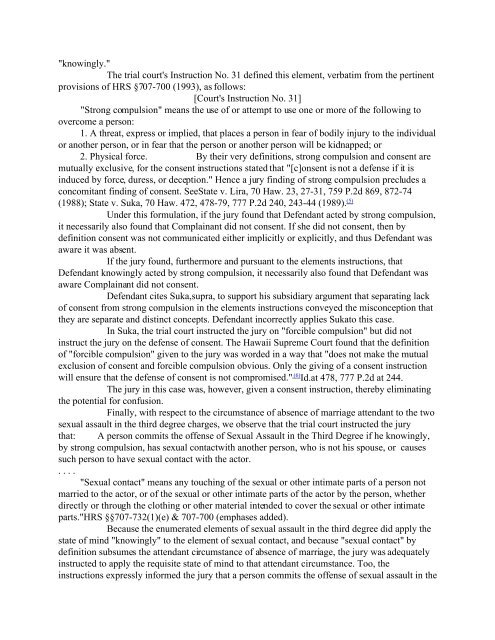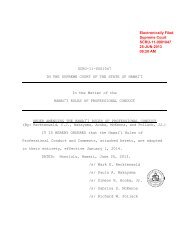standards of review. - State of Hawaii
standards of review. - State of Hawaii
standards of review. - State of Hawaii
You also want an ePaper? Increase the reach of your titles
YUMPU automatically turns print PDFs into web optimized ePapers that Google loves.
"knowingly."<br />
The trial court's Instruction No. 31 defined this element, verbatim from the pertinent<br />
provisions <strong>of</strong> HRS §707-700 (1993), as follows:<br />
[Court's Instruction No. 31]<br />
"Strong compulsion" means the use <strong>of</strong> or attempt to use one or more <strong>of</strong> the following to<br />
overcome a person:<br />
1. A threat, express or implied, that places a person in fear <strong>of</strong> bodily injury to the individual<br />
or another person, or in fear that the person or another person will be kidnapped; or<br />
2. Physical force. By their very definitions, strong compulsion and consent are<br />
mutually exclusive, for the consent instructions stated that "[c]onsent is not a defense if it is<br />
induced by force, duress, or deception." Hence a jury finding <strong>of</strong> strong compulsion precludes a<br />
concomitant finding <strong>of</strong> consent. See<strong>State</strong> v. Lira, 70 Haw. 23, 27-31, 759 P.2d 869, 872-74<br />
(1988); <strong>State</strong> v. Suka, 70 Haw. 472, 478-79, 777 P.2d 240, 243-44 (1989). (5)<br />
Under this formulation, if the jury found that Defendant acted by strong compulsion,<br />
it necessarily also found that Complainant did not consent. If she did not consent, then by<br />
definition consent was not communicated either implicitly or explicitly, and thus Defendant was<br />
aware it was absent.<br />
If the jury found, furthermore and pursuant to the elements instructions, that<br />
Defendant knowingly acted by strong compulsion, it necessarily also found that Defendant was<br />
aware Complainant did not consent.<br />
Defendant cites Suka,supra, to support his subsidiary argument that separating lack<br />
<strong>of</strong> consent from strong compulsion in the elements instructions conveyed the misconception that<br />
they are separate and distinct concepts. Defendant incorrectly applies Sukato this case.<br />
In Suka, the trial court instructed the jury on "forcible compulsion" but did not<br />
instruct the jury on the defense <strong>of</strong> consent. The <strong>Hawaii</strong> Supreme Court found that the definition<br />
<strong>of</strong> "forcible compulsion" given to the jury was worded in a way that "does not make the mutual<br />
exclusion <strong>of</strong> consent and forcible compulsion obvious. Only the giving <strong>of</strong> a consent instruction<br />
will ensure that the defense <strong>of</strong> consent is not compromised." (6) Id.at 478, 777 P.2d at 244.<br />
The jury in this case was, however, given a consent instruction, thereby eliminating<br />
the potential for confusion.<br />
Finally, with respect to the circumstance <strong>of</strong> absence <strong>of</strong> marriage attendant to the two<br />
sexual assault in the third degree charges, we observe that the trial court instructed the jury<br />
that: A person commits the <strong>of</strong>fense <strong>of</strong> Sexual Assault in the Third Degree if he knowingly,<br />
by strong compulsion, has sexual contactwith another person, who is not his spouse, or causes<br />
such person to have sexual contact with the actor.<br />
. . . .<br />
"Sexual contact" means any touching <strong>of</strong> the sexual or other intimate parts <strong>of</strong> a person not<br />
married to the actor, or <strong>of</strong> the sexual or other intimate parts <strong>of</strong> the actor by the person, whether<br />
directly or through the clothing or other material intended to cover the sexual or other intimate<br />
parts."HRS §§707-732(1)(e) & 707-700 (emphases added).<br />
Because the enumerated elements <strong>of</strong> sexual assault in the third degree did apply the<br />
state <strong>of</strong> mind "knowingly" to the element <strong>of</strong> sexual contact, and because "sexual contact" by<br />
definition subsumes the attendant circumstance <strong>of</strong> absence <strong>of</strong> marriage, the jury was adequately<br />
instructed to apply the requisite state <strong>of</strong> mind to that attendant circumstance. Too, the<br />
instructions expressly informed the jury that a person commits the <strong>of</strong>fense <strong>of</strong> sexual assault in the
















